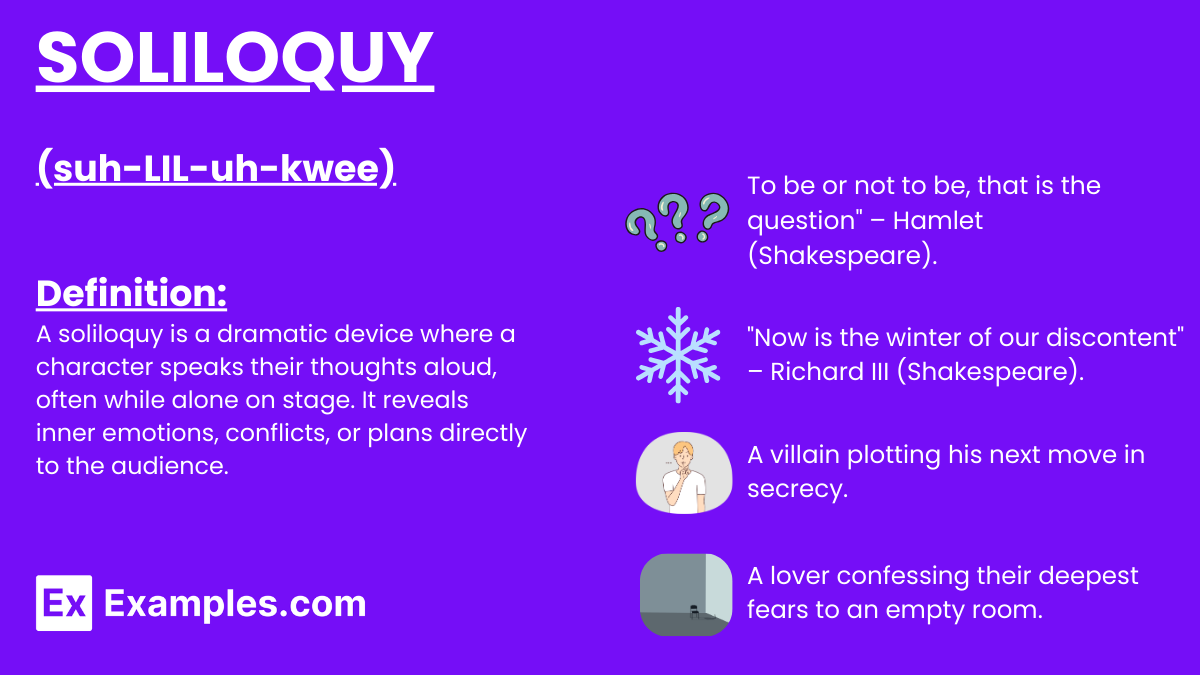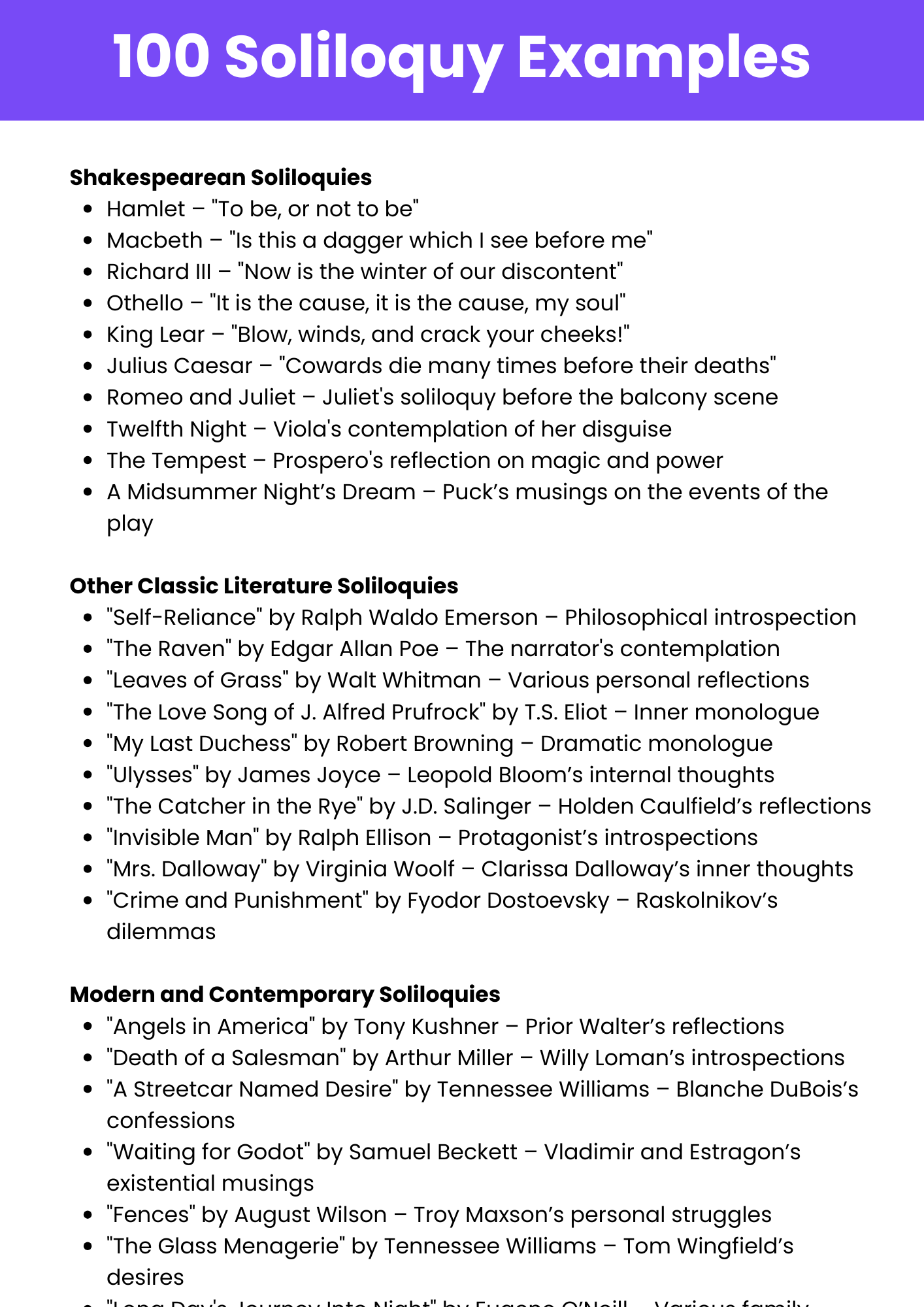Soliloquy
What is Soliloquy? – Definition
A soliloquy is a dramatic device in which a character speaks their thoughts aloud, typically alone on stage. This allows the audience to gain insight into the character’s inner motivations, feelings, and conflicts.

Generated Soliloquy Examples

Download Soliloquy Examples
Enhance your understanding with our comprehensive PDF guide.
Download PDFExamples of Soliloquy
- To be, or not to be: that is the question: Whether ’tis nobler in the mind to suffer
- O, what a rogue and peasant slave am I! Is it not monstrous that this player here,
- Now is the winter of our discontent Made glorious summer by this sun of York;
- All the world’s a stage, And all the men and women merely players;
- I have of late—but wherefore I know not—lost my mirth, Being troubled with too many questions.
- This above all: to thine own self be true, And it must follow, as the night the day,
- Thus conscience does make cowards of us all, And thus the native hue of resolution
- Now cracks a noble heart. Good night, sweet prince, And flights of angels sing thee to thy rest!
- Friends, Romans, countrymen, lend me your ears; I come to bury Caesar, not to praise him.
- Out, out, brief candle! Life’s but a walking shadow, a poor player
- O Romeo, Romeo! wherefore art thou Romeo? Deny thy father and refuse thy name;
- To die, to sleep— To sleep, perchance to dream—ay, there’s the rub,
- If music be the food of love, play on; Give me excess of it; that surfeiting,
- When sorrows come, they come not single spies, But in battalions!
- Tomorrow, and tomorrow, and tomorrow, Creeps in this petty pace from day to day,
- What a piece of work is man! How noble in reason, how infinite in faculty!
- To be, or not to be: that is the question: Whether ’tis nobler in the mind to suffer
- O, full of scorpions is my mind, dear wife! Thou know’st that I am settled for thee,
- Is this a dagger which I see before me, The handle toward my hand? Come, let me clutch thee.
- There’s a special providence in the fall of a sparrow. If it be now, ’tis not to come; if it be not to come, it will be now;
- Out, out, brief candle! Life’s but a walking shadow, a poor player
- So foul and fair a day I have not seen. Twice blest by fire, I have survived the heat;
- O, what a noble mind is here o’erthrown! The courtier’s, soldier’s, scholar’s, eye, tongue,
- To be or not to be, that is the question: Whether ’tis nobler in the mind to suffer
- Is this a dagger which I see before me, The handle toward my hand? Come, let me clutch thee.
- All the world’s a stage, And all the men and women merely players;
- There’s a special providence in the fall of a sparrow. If it be now, ’tis not to come; if it be not to come, it will be now;
- What a piece of work is a man! How noble in reason, how infinite in faculty!
- O, what a noble mind is here o’erthrown! The courtier’s, soldier’s, scholar’s, eye, tongue,
Types of Soliloquy
Internal Soliloquy
A soliloquy that reveals the inner thoughts and feelings of a character without addressing any other characters.
- To be or not to be, that is the question.
- What a rogue and peasant slave am I!
- Now cracks a noble heart. Good night, sweet prince.
- Thus conscience does make cowards of us all.
- Now is the winter of our discontent.
Implied Soliloquy
A soliloquy that is not explicitly stated but inferred through the character’s actions or dialogue.
- The character pauses and looks away, hinting at internal conflict.
- Silent expressions convey the character’s turmoil.
- A reflective gaze suggests deep contemplation.
- Gestures and movements indicate unspoken thoughts.
- Facial expressions reveal the character’s inner dilemmas.
Narrative Soliloquy
A soliloquy that advances the plot by revealing crucial information or character intentions.
- I must devise a plan to save my kingdom from ruin.
- Only by betraying my closest friend can I achieve my goals.
- The weight of leadership presses heavily upon my shoulders.
- I foresee betrayal within my ranks and must act swiftly.
- To save my loved ones, I must embrace the darkness within.
Philosophical Soliloquy
A soliloquy that delves into philosophical questions, exploring existential themes and moral dilemmas.
- What is the essence of humanity? Are we merely products of our environment?
- Is free will an illusion, or do we truly have control over our destinies?
- Does life have inherent meaning, or do we assign our own purpose?
- Can true happiness exist without suffering and struggle?
- What defines a person’s identity: nature or nurture?
Emotional Soliloquy
A soliloquy that expresses the character’s intense emotions, revealing vulnerabilities and personal struggles.
- I feel the weight of the world pressing down on my shoulders.
- My heart aches with a sorrow I cannot bear alone.
- Joy and despair dance within me, a tumultuous storm of feelings.
- Fear grips my soul as uncertainty clouds my path.
- Love and hate intertwine, creating a complex tapestry of emotions.
Political Soliloquy
A soliloquy that addresses political themes, exploring power dynamics, governance, and societal issues.
- How can I govern justly when corruption taints every corner of power?
- The voices of the people demand change, yet fear silences their cries.
- Power corrupts absolutely, but is absolute power still a necessity?
- Injustice anywhere is a threat to justice everywhere.
- The balance of power teeters precariously as alliances shift and loyalties wane.
How to Identify/Find Soliloquy?
To identify a soliloquy, look for moments in a play where a character speaks alone on stage, revealing their inner thoughts and feelings directly to the audience.
- Identify scenes where a character is alone or isolates themselves from others.
- Look for speeches that express personal thoughts, dilemmas, or emotions.
- Notice if the speech advances character development or plot by revealing key insights.
- Check for a direct address to the audience, breaking the fourth wall.
- Observe if the character’s speech is introspective and reflective in nature.
How to Use Soliloquy?
Use soliloquy to provide depth to your characters, offering the audience a window into their internal struggles, motivations, and desires. It can also be used to foreshadow events and enhance the emotional impact of the narrative.
- Craft speeches that reveal the character’s true intentions and conflicts.
- Use soliloquies to explore complex emotions and ethical dilemmas.
- Integrate soliloquies at pivotal moments to heighten tension and suspense.
- Ensure that soliloquies contribute meaningfully to character development and plot progression.
- Balance soliloquies with dialogue to maintain narrative flow and prevent monotony.
Other Soliloquy Examples
Soliloquy in Daily Writing
Everyday writing can utilize soliloquy to enhance narrative depth and reader engagement.
- I can’t believe how much I’ve changed since last year.
- Why do I always find myself procrastinating?
- If only I could turn back time, things would be different.
- Am I making the right decisions for my future?
- How do I overcome the fear that’s holding me back?
Soliloquy Examples for Kids
Introduce children to soliloquy with simple and relatable examples that demonstrate the flow of thoughts.
- I wonder what adventures await me today.
- Why did the butterfly choose this flower to land on?
- If only I could fly like the birds in the sky.
- How can I make my friends happy today?
- I wish I could solve this tricky puzzle all by myself.
Soliloquy Examples for Students
Provide students with examples that showcase the versatility and depth of soliloquy in academic writing.
- Through soliloquy, the character unveils the moral complexities that underpin his actions, offering a window into his ethical struggles.
- Analyzing soliloquies in Shakespeare’s plays reveals the intricate interplay between character motivation and narrative progression.
- Modern playwrights employ soliloquy to break conventional boundaries, allowing characters to engage directly with the audience.
- The strategic use of soliloquy enhances character development by providing intimate access to their innermost thoughts.
- Soliloquies serve as a narrative device to foreshadow events and reveal hidden motivations within the plot.
Soliloquy Examples for Class 4
Age-appropriate and engaging soliloquy examples for younger students to grasp the concept easily.
- I wonder what adventures await me today.
- Why did the butterfly choose this flower to land on?
- If only I could fly like the birds in the sky.
- How can I make my friends happy today?
- I wish I could solve this tricky puzzle all by myself.
Explore Other Literary Devices
Elevate Your AP English Preparation
Unlock your potential with our comprehensive AP English exam preparation tools designed to help you excel.
- Extensive Question Bank: Access 900+ exam-like questions for both AP English Language and Literature.
- Expertly Crafted: Questions mirror the structure and difficulty of actual AP exams, ensuring relevant practice.
- Detailed Explanations: Understand your mistakes with clear, concise breakdowns of correct and incorrect answers.
- Personalized Learning: Tailor your study sessions with topic-specific tests and adaptive learning tools.
- Comprehensive Coverage: Master all aspects of the AP English curriculum with extensive guides and resources.
Frequently Asked Questions
-
What is the full meaning of soliloquy?
A soliloquy is a dramatic device where a character speaks their thoughts aloud, typically alone on stage, to provide insight into their internal feelings and conflicts. -
What is a soliloquy vs monologue?
A soliloquy reveals a character’s inner thoughts and feelings without addressing other characters, while a monologue may be directed at other characters or the audience. -
What is an example of a soliloquy?
A famous example is Hamlet’s “To be or not to be” soliloquy, where he contemplates existence and his inner turmoil in William Shakespeare’s play *Hamlet*. -
What is the synonym of soliloquy?
Synonyms for soliloquy include “monologue,” “speech,” “oration,” or “discourse,” though these terms may not always capture its specific theatrical usage. -
Is soliloquy good or bad?
Soliloquies are neither inherently good nor bad; they are a tool used in literature and drama to provide character depth and insight. Their effectiveness depends on their execution and relevance to the story. -
Who coined the term soliloquy?
The term “soliloquy” originates from the Latin words “solus” (alone) and “loqui” (to speak). It was first used in English in the late 16th century, but its precise originator in English literature is unclear.

